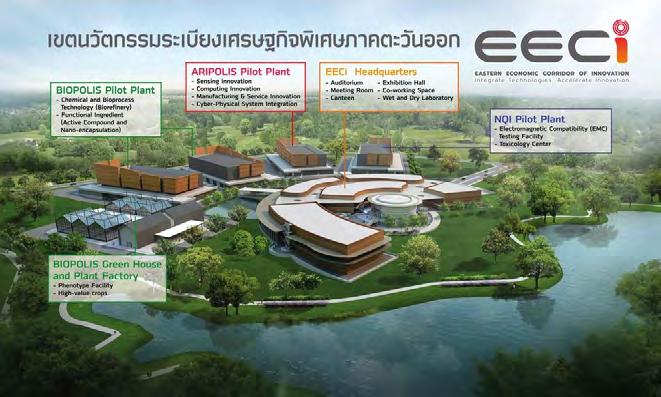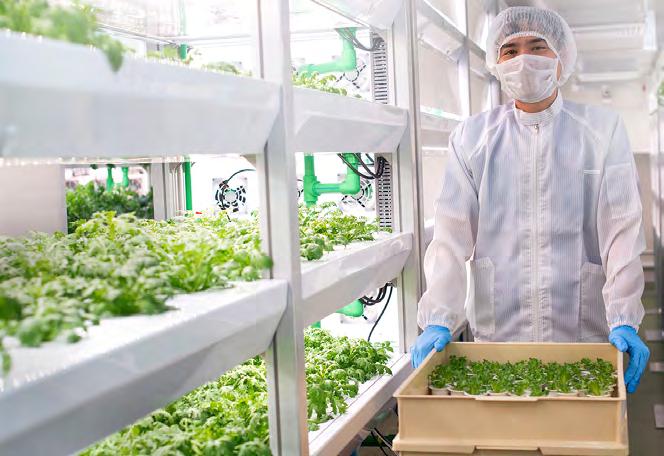
4 minute read
Thailand – A hub for green biotechnology
Thomas Hundt
Green biotechnology is a particularly important applied science in Thailand. It supports significantly economic development, especially the progress of agriculture and food industry. The agriculture sector contributes a massive 8 per cent to the gross domestic product and the food industry is the largest industry in the country.
Advertisement
The country has earned a reputation as the “kitchen of the world” because food is a leading product. Thailand is the world’s largest exporter of corn, starch and canned pineapple and was ranked second largest in exports of rice and sugar in 2019.
Agriculture and biotechnology are therefore among the 10 sectors that receive particular promotion as part of the long-term Thailand 4.0 strategy that was adopted in 2017. The investment promotion agency Thailand Board of Investment (BOI) awards generous grants to investors. It exempts biotechnology companies from corporate tax and import duties for 8 to 13 years, depending on the technology used and their own development activities, and grants simplified work permits to foreigners employed in this sector.
Leading the agro-food industry into the future
In 2004, the Ministry of Science established a political Biotechnology framework with the National Biotechnology Policy Framework strategy paper, which it has continuously updated since then. The strategic goals are to improve competitiveness as well as strengthen innovations in biotechnology and in the downstream industries.
The Ministry of Agriculture has banned the commercial cultivation of genetically modified organisms (GMOs) since 2003. Genetically modified seeds may be used for research purposes. However, according to experts, there have been no field tests with GMOs since 2003.
A law on biosafety is discussed since 2007. It is intended to put green biotechnology, genetic engineering, research and commercialization of biotech products on a legal basis. The Ministry of Natural Resource and Environment is responsible for drafting the law.
Biotechnology therefore works with methods from conventional plant breeding, such as genetic engineering and marker aided selection is an indirect selection process where a trait of interest is selected based on a marker-based selection of plants with improved properties. Biotechnology therefore provides significant support for the successes of the agricultural industry, the efficiency of processes and improved quality of agricultural products.
The Ministry of Agriculture has been running the Agricultural Research Development Agency (ARDA) since 2003, which among other things researches new biotechnical applications.

Image credit: Eastern Economic Corridor of Innovation (EECi)
The National Center for Genetic Engineering and Biotechnology (BIOTEC), the research institute responsible for biotechnology, was founded in 1983. The institute is located in the north of Bangkok in one of the most important science parks in the country, next to the Thammasat University campus.
BIOTEC has databases of the genomes of rice, cassava, shrimp, spirulina, oil palms, rubber trees and other species which are also opened to the public with this scientific basis and its expertise on Marker-Assisted Selection Technology, BIOTEC can quickly develop new plant varieties with desirable properties to meet the market demands.
Microbial biotechnology research is one of the areas BIOTEC’s expertise lies in. BIOTEC see to that the entire value chain of innovation process from fundamental research to applied research to commercialization is in place. Fundamental research focuses on biology of plants and microbes with the emphasis on the collection, isolation, identification and preservation of microbial cultures for BIOTEC in-house research programs and for the country’s depository. The program also seeks to explore the potential application of these microbe such as bioactive and enzyme screening. The utilization part encompasses the development of microbes and microbial- derived products for different applications including development of enzyme products for food and feed production and other industrial processes.
Cooperation with foreign countries intensifying
According to experts, Thailand needs more know-how and foreign technologies in order to convert agricultural products or waste into bioplastics, biochemicals and other high-valuable substances for various industrial application. BIOTEC has aggressively pursued collaboration with German partners such as Fraunhofer Center for Chemical-Biotechnological Processes CBP and Institute of Bio- and Geosciences (IBG), Forschungszentrum Jülich.
Because of the Covid-19 pandemic, for example, the consumption of packaging and protective equipment made of plastics is increasing. Thailand therefore wants to develop a larger bioplastics industry.

The BOI has already approved 15 projects in this area for a total of US$ 530 million. And the Japanese biotechnology company, Spiber announced in February 2020 that it would build the world’s largest plant for fermentation and purification of proteins in Rayong Province.
Largest bioreactor in South-East Asia
A new research and development hub and an industrial cluster for green biotechnology are currently being built in Thailand’s Eastern Economic Corridor of Innovation (EECi), Rayong Province. The National Science and Technology Development Agency (NSTDA), in partnership with a European company, has been working on a project to establish a biorefinery pilot plant as a central facility to advance targeted biorefinery technologies to higher Technology Readiness Level (TRL). Thailand will have its first biorefinery pilot plant, with bioreactor capacity of up to 15,000 litres at Biopolis EECi for both public and private sectors to scale up and validate their laboratory prototype and perform the techno-economic feasibility study before investing on a specific production line.
The major Thai agro- and food groups CP, Betagro, Thai Union and Mitr Phol also have their own biotechnological research and development departments.
Interested companies can use the database at Biotechthailand.com to search further for more industry companies and organisations. The German-Thai Chamber of Commerce offers its service for your market entry and usiness matchmaking.
Contact details: Thomas Hundt Director Thailand, Cambodia, Myanmar, Laos GERMANY TRADE & INVEST www.gtai.com









